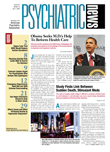A case-control study in children and adolescents adds to evidence supporting a link between the use of stimulants, commonly used to treat attention-deficit/hyperactivity disorder (ADHD), and an increase in the risk of sudden death in this population.
The researchers in a study led by Madelyn Gould, Ph.D., M.P.H., and published online June 15 in AJP in Advance examined mortality data and death certificates from states' vital-statistics reports from 1985 through 1996 and identified 564 cases of sudden unexplained death (including from sudden cardiac dysrhythmia and unknown causes) in children and adolescents aged 7 to 19. A control group of 564 youths who died as passengers in motor vehicle accidents were matched to the case series for age, sex, year of death, and data source.
Gould is a professor of clinical epidemiology in psychiatry at Columbia University College of Physicians and Surgeons and a research scientist at the New York State Psychiatric Institute.
The analysis found a significant association between sudden unexplained death and the use of a stimulant at the time of death.
Ten (1.8 percent) of the youth in the sudden-death group were taking the stimulant methylphenidate. In comparison, two (0.4 percent) in the control group were taking stimulants, one of whom was taking methylphenidate. The risk increase was statistically significant, with an odds ratio of 7.4 (95 percent confidence interval: 1.4 to 74.9). This association remained statistically significant in a sensitivity analysis excluding cases in which the youth were using concomitant tricyclic antidepressants.
Because of numerous case reports of sudden death that have been linked to stimulant use and the known cardiovascular effects of these drugs, the Food and Drug Administration (FDA) has been monitoring and analyzing stimulant-related, adverse-reaction reports for several years.
The Canadian regulatory agency, Health Canada, suspended the marketing of mixed amphetamine salts briefly in 2005 out of concern about a possible association between the drug and sudden cardiac death, but later allowed its return after a stronger warning was added to the product labeling.
Both countries' regulatory agencies currently recommend that stimulants not be used in children or adults with structural cardiac abnormalities, cardiomyopathy, or other cardiac abnormalities.
On the same day the study was published, the FDA issued a public announcement urging parents not to stop a child's stimulant medication on the basis of this study alone. “Given the limitations of this study's methodology, the FDA is unable to conclude that these data affect the overall risk and benefit profile of stimulant medications used to treat ADHD in children,” according to the announcement, which also noted that the FDA and the Agency for Healthcare Research and Quality are sponsoring a large epidemiological study on this issue, and additional data are forthcoming.
“[The Gould study] is the first methodologically rigorous study to identify a link between therapeutic use of stimulant medication and sudden unexplained deaths in children without demonstrated heart abnormalities,” wrote Benedetto Vitiello, M.D., and Kenneth Towbin, M.D., in an editorial accompanying the study. Nevertheless, they cautioned that as sudden unexplained death is very rare in children and adolescents, this study had to rely on small numbers, and “it is not possible to quantify the risk beyond estimating that it is very small.”
Vitiello is chief of the National Institute of Mental Health (NIMH) Child and Adolescent Treatment and Preventive Intervention Research Branch. Towbin is chief of Clinical Child and Adolescent Psychiatry in the Mood and Anxiety Disorder Program at NIMH.
Although retrospective studies are at risk of being contaminated by confounding factors and inherent biases, it would be nearly impossible to conduct prospective, randomized clinical trials to prove the link between stimulant use and sudden death, since the rate is so small, the editorial noted; however, a biological basis exists for the cardiovascular risks of these drugs. Considering the widespread use of stimulants for ADHD and the substantial rates of diversion and misuse, especially among high school and college students, clinicians should be careful when prescribing them.“ Stimulants are not innocuous and ... their therapeutic use requires careful diagnostic assessment, diligent safety screening, and ongoing monitoring,” Vitiello and Towbin wrote.
The study was funded by the FDA and NIMH.
“Sudden Death and Use of Stimulant Medications in Youths” is posted at<ajp.psychiatryonline.org/cgi/reprint/appi.ajp.2009.09040472v1>. The editorial “Stimulant Treatment of ADHD and Risk of Sudden Death in Children” is posted at<ajp.psychiatryonline.org/cgi/reprint/appi.ajp.2009.09050619v1>. The FDA announcement is posted at<www.fda.gov/Safety/MedWatch/SafetyInformation/SafetyAlertsforHumanMedicalProducts/ucm166667.htm>.▪
